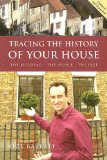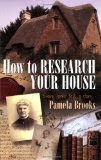 |
| Old Oshawa Public Library - built in 1909 south west corner of Simcoe and Athol Streets Public domain: Copyright expired. Source: OurOntario.ca |
• Researching Your Family Tree
• Researching Your House
• Research Resources
Amazon has some great free ebooks to help get you started!
US | Biographies and Memoirs • True Accounts • Genealogy
Canada | Biographies and Memoirs • True Accounts • Genealogy
UK | Biographies and Memoirs • True Accounts • Genealogy
SEARCH: Birth Records
RESEARCHING YOUR HOUSE
 An Uncommon Cape: Researching the Histories and Mysteries of a Property (US)
An Uncommon Cape: Researching the Histories and Mysteries of a Property (US)by Eleanor Phillips Brackbill
-- tells the story of the author’s small Cape Cod house on one-third of an acre—a story with several mysteries.
A wide-ranging investigation forms the basis of an eight-year research journey—like a segment of PBS’s History Detectives — not only to solve the mysteries but also to answer the broader question, "What came before?"
The book includes more than 60 images and guidelines in twenty-two sidebars to help you find the story of your home.
Find it on: Amazon.com | Amazon.ca | Amazon.co.uk
 House Histories: A Guide to Tracing the Genealogy of Your Home (US)
House Histories: A Guide to Tracing the Genealogy of Your Home (US)by Sally Light, Margaret Eberle
-- Many people who have acquired older homes over the past decade have often become intrigued by questions about its origins, style, materials, past owners and events.
In this comprehensive book, the reader is guided through the fun of finding the clues to his or her home's history.
Find it on: Amazon.com | Amazon.ca | Amazon.co.uk
 Tracing the History Of Your House: A Guide to Sources (US)
Tracing the History Of Your House: A Guide to Sources (US)by Nick Barratt
-- The essential purchase for anyone researching a house or locality: find out who built your house, when it was built, who the previous occupants were, and how they decorated it! This fully revised and expanded guide to house history is for anyone interested in how buildings, streets and towns have changed - or even stayed the same.
It explores the many kinds of information available to the amateur house detective, and offers expert guidance for navigating the information sources and records. These include the three great land surveys of the 19th and early 20th centuries, the records of the Land Registry, and conveyancing documents.
For those looking farther back in time, the book covers tax and manorial documents for properties dating to the medieval period. The author also reveals how more modern dwellings can be studied through building plans, local directories, electoral lists and rate books.
Find it on: Amazon.com | Amazon.ca | Amazon.co.uk
 How to Research Your House: Every Home Tells a Story (US)
How to Research Your House: Every Home Tells a Story (US)by Pamela Brooks
-- Do you want to know more about the history of your house, find out about the lives of former inhabitants, and discover more about the local community in which your house stands?
Pamela Brooks, author of "How to Research Local History" will help you get started.
She'll take you step by step along a fascinating trail of discovery, starting with the building itself and progressing to who lived there.
Find it on: Amazon.com | Amazon.ca | Amazon.co.uk
 Discovering the History of Your House: And Your Neighborhood (US)
Discovering the History of Your House: And Your Neighborhood (US)by Betsy J. Green
-- Demonstrating how to obtain information and organize it into a lively narrative history, this practical guide helps curious homeowners chronicle the stories of their homes.
Previous owners, architects, community newspapers, and local and state agencies are some of the valuable sources discussed.
With these tools, homeowners can inexpensively and easily create a legacy that will enhance the emotional and financial value of their property for family and future owners. A state-by-state guide to resources is also included.
Find it on: Amazon.com | Amazon.ca | Amazon.co.uk
 Tracing Your House History: A Guide For Family Historians (US)
Tracing Your House History: A Guide For Family Historians (US)by Gill Blanchard
-- Anyone who wants to find out about the history of their house - of their home - needs to read this compact, practical handbook. Whether you live in a manor house or on a planned estate, in a laborer's cottage, a tied house, a Victorian terrace, a twentieth-century council house or a converted warehouse - this is the book for you.
In a series of concise, information-filled chapters, Gill Blanchard shows you how to trace the history of your house or flat, how to gain an insight into the lives of the people who lived in it before you, and how to fit it into the wider history of your neighborhood.
A wealth of historical evidence is available in libraries, archives and record offices, in books and online, and this is the ideal introduction to it. Gill Blanchard explores these resources in depth, explains their significance and directs the researcher to the most relevant, and revealing, aspects of them. She makes the research process understandable, accessible and fun, and in the process, she demystifies the sometimes-obscure language and layout of the documents that researchers will come up against.
Find it on: Amazon.com | Amazon.ca | Amazon.co.uk
 Researching the History of a Country House (US)
Researching the History of a Country House (US)by Richard Goodenough
-- The origins of this book date from the early 1990s when the author began to research the history of his own country house in the Kent Downs at Trimworth, near Canterbury. These early investigations led him to see how Trimworth could be used as a case study in a voyage of discovery which others could also enjoy.
The book will be most relevant to the owners of country houses, providing a methodology for the less experienced to trace an exciting pathway of inquiry. It is based on an exploration of a wide range of maps and documentary sources available from local, regional and national archive centres.
This fully illustrated guide encourages a systematic process of research into the fascinating and topical subject of house history and makes frequent reference to online sources.
Find it on: Amazon.com | Amazon.ca | Amazon.co.uk
 ~*~ by Catherine McDiarmid-Watt, author of OshawaJournal.com, researching her 1850's house, the history of old homes, the genealogy of the founding families in Oshawa - as well as citylife and farm life in the 1800's, with old news clippings, well-researched articles, and "then and now" photos with the help of her "history dogs", Denny and Dexter.
~*~ by Catherine McDiarmid-Watt, author of OshawaJournal.com, researching her 1850's house, the history of old homes, the genealogy of the founding families in Oshawa - as well as citylife and farm life in the 1800's, with old news clippings, well-researched articles, and "then and now" photos with the help of her "history dogs", Denny and Dexter.• Follow me on Twitter, join the conversation on Facebook, circle me on Google+, follow my pins on Pinterest.
Related Article:









0 comments:
Post a Comment
WE LOVE COMMENTS!
Don't just sit there, reading this article - say something! Do you have a question? Do you wish you knew where to start? Do you have a story or memory to share?